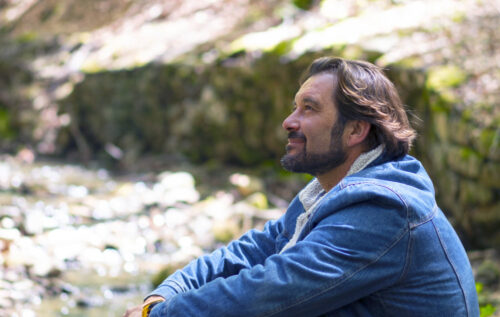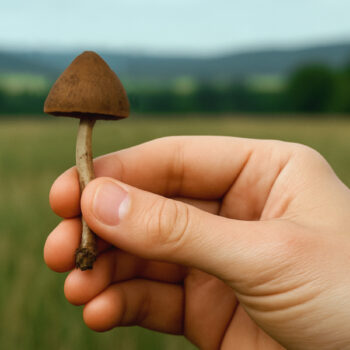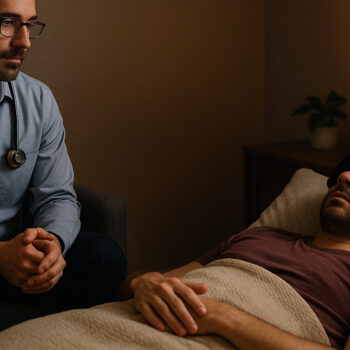Psychedelic Retreat for depression : an effective booster?

Can depression be treated with psychedelic retreats?
Faced with the challenges of living with depression, each person seeks their own path to healing. People explore different therapies, alternative approaches, or spiritual practices. Some may consult a psychiatrist or opt for talk therapy. Others explore different therapies, alternative approaches, or spiritual practices. In the quest for a more fulfilling life, various treatments and methods have emerged. They range from antidepressants and dietary supplements to mental health retreats for depression.
The hope of psilocybin-assisted retreats
Psychedelic retreats for depression are now a promising avenue for individuals seeking to treat this debilitating illness. Participants must thoroughly understand them as part of a comprehensive process before embarking on it. Treatments such as these aim to balance the neurotransmitters that play a role in mood and behavior.
Before delving deeper into the topic of spiritual retreats for depression, it’s important to understand the nature of this illness. We should also consider the therapeutic pathways that are currently available.
Jump to the section on retreats for depression
Depression: Signs and Symptoms
Depression is not merely an occasional bout of sadness or feeling of being down, as everyone may experience. It is a disorder that persists for at least two weeks and can continue for months or even years.
Depression is a multifaceted illness. It can be temporary for some, while accompanying others for many years. Individuals who are depressed and experience long-term symptoms of depression often feel like they are missing out on life. Dark thoughts and feeling of hopeless prevent them from enjoying simple moments, anxieties disrupt their emotional stability. As a result, they may lack motivation to embark on new endeavors.
Patients with depression often describe feeling overwhelmingly fatigued and lacking motivation. They experience a complete absence of energy from the moment they wake up. They become unable to perform tasks that were once natural to them, such as doing dishes, running errands, or attending social gatherings. However, a person experiencing depression is not necessarily bedridden, lacking motivation, or constantly brooding.
In fact, this illness can manifest in various forms, presenting symptoms like changes in libido, irritability, and difficulty concentrating. Other signs include eating disturbances (either decreased or increased appetite) and even suicidal thoughts.
Depression can also affect sleep quality, resulting in staying up late, difficulty getting to bed, excessive or insufficient sleep. Overall, the illness can transport the individual from one extreme to another, making the diagnosis sometimes complex or lengthy.
However, there is a common thread among almost all patients, whether consciously or unconsciously. Depression affects self-esteem. The person feels worthless, and may even experience feelings of guilt. The individual perceives themselves trapped in a life of suffering and withdrawing from social interactions.
The Different Types of Clinical-depression
The World Health Organization (WHO) estimates that 300 million people worldwide suffer from one form or another of this illness. It is a colossal public health issue. Medical professionals now recognize four major types of depressive disorders. While they may not all have the same impact on individuals’ quality of life, none should be taken lightly, waiting for it to pass.
- Major depression is also known as major depressive disorder or severe depression. This type features persistent melancholy, lack of motivation, and emotional disengagement. These symptoms, along with a loss of pleasure, last for more than two weeks.
- When symptoms of sadness, demotivation, and fatigue consistently occur at the same time each year, it is known as seasonal affective disorder. Typically, this phenomenon occurs during the winter months.
- Women who have recently given birth may experience postpartum depression within six months after childbirth. In this scenario, the new mother feels helpless and incapable of caring for her child. This leads to more severe bouts of melancholy than what is typically seen with “baby blues.”
- Finally, in 2023, the scientific community also recognized the existence of cognitive depression. It takes a form that may resemble certain aspects of burnout.
Cognitive depression
In detail, cognitive depression, or cognitive biotype, is characterized by intellectual slowing and periods of insomnia. Decreased activity in the frontal cortex affects the person, leading to difficulties in planning ahead, exercising self-control, and maintaining concentration. It also hampers their ability to correct inappropriate behaviors.
According to a study on cognitive depression published in JAMA, this new form of mental illness appears to be resistant to antidepressants that target serotonin, such as Sertraline (Effexor).
There is also a type of depression associated with bipolar disorder, which alternates with characteristic periods of excitement. One could even extrapolate by mentioning how post-traumatic stress disorder (PTSD) can also be a contributing factor to depression.
In Search of Effective Therapies
The Limits of Antidepressants
Antidepressants, which target neurotransmitters, have been a staple in treating depression since the 1970s. While Prozac is among the most recognized, there are various classes of antidepressants. These include selective serotonin reuptake inhibitors (SSRIs), tricyclic antidepressants (TCAs), monoamine oxidase inhibitors (MAOIs), and serotonin-norepinephrine reuptake inhibitors (SNRIs).
These antidepressants help many people, but unfortunately, not everyone… Today, we know that several forms of depression can be resistant to medication treatments. Additionally, the short-term and long-term side effects of antidepressants can be unpleasant and discourage patients. They could include fatigue, irritability, digestive disturbances, emotional detachment, and memory loss.
Exploring Alternative Therapeutic Approaches
These unwanted effects have led some individuals to try alternative therapeutic solutions. Many often consider psychotherapy as a secondary option in the treatment of depression. Its effectiveness depends on the patient, their emotional receptivity, and many other factors that are still unknown.
Given the relative effectiveness of conventional treatments, several therapeutic approaches have emerged to combat depression. These include St. John’s wort, Griffonia simplicifolia, meditation, fasting, microdosing of magic mushrooms or LSD.

Retreats for Depression: A Fresh Perspective on Treatment?
In recent years, several organizations have offered psychedelic-assisted therapy to individuals seeking treatment for depression. People are therefore looking for an easy way to access new paths for personal development. Thus, they consider sometimes psychedelic retreats as kinds of retreats for depression. These centers primarily incorporate psilocybin magic truffles or Ayahuasca in their offers.
These retreats are founded on scientific research. It has shown that psychedelic substances can match or exceed the effects of synthetic medications in fighting major depressive symptoms. Such findings apply to certain patients who have been tested.
What does a retreat for depression mean?
To be clear, Dutch law does not officially recognize what are called “retreats for depression.” This term is a misnomer. It is true that psilocybin is recognized for its effectiveness in treating depression. It is also true that many participants come to these retreats to overcome depression. However, in reality, these retreat centers also welcome all kinds of people and are not specific to the treatment of depression.
Similarly, Dutch law does not recognize psilocybin as a form of treatment. To date, there is no completely effective and legal treatment.
The Inner Workings of a Depression Retreat
At the core of these “depression retreats” is the idea of leveraging the neurochemical changes incited by substances like magic mushroom’s truffles in a controlled, serene, and lawful environment. After consumption, these substances induce hallucinations and trigger a cascade of cognitive shifts. This helps individuals delve deeper into their emotions and pinpoint the origins of their illness.
This can be particularly useful for those who experience agitation as a symptom of their condition.
“It’s a unique opportunity to feel more intensely, to enter a world saturated with sensations, and to create a breach in one’s own emotional barriers.”
During a psychedelic journey, intense but temporary sounds, images, and disruptions stimulate the brain. Furthermore, the experience can bring forth buried, forgotten, or repressed memories and emotions. Psilocybin and ayahuasca are hallucinogenic substances that disrupt the usual functioning of neurons. They encourage increased communication between these cells. For the participant, it is a unique opportunity to experience intensified sensations, enter a world saturated with feelings, and create a breakthrough in their own emotional barriers.
Enjoy a 100% legal psilocybin experience in the Netherlands
Preparation and retreat in English
Enjoy a legal & intense experience in the Netherlands
A psychedelic retreat designed for best results. Small group, one-to-one preparation, experimented facilitators, 1 year monthly integration & awesome place !
Join us

Emotional Accessibility and its Implications
Through this crack in the armor, it becomes easier to understand emotions, gain a detached perspective, or fathom their severity. Several hours after the end of their psychedelic experience, some individuals directly testify to a sense of inner peace.
For some, the augmented activity of synaptic serotonin receptors paves the way for a mental landscape more receptive to introspection. The weeks succeeding the retreat witness the brain maintaining its connection to profound emotions, positioning the participant to capitalize on this newfound emotional receptiveness, possibly complementing it with interpersonal or cognitive behavioral therapies.
Without the usual psychological barriers, the work done with a psychologist or healthcare professional would be much deeper. Many believe that a psychoactive molecule triggering the brain’s plasticity enables rapid reconfiguration without needing a lengthy process.
Trust and Mental Health
Those battling treatment-resistant depression, a particularly challenging form of the mental illness, sometimes view psychedelic retreats as a potential cure. They see it as a method to prevent relapse or as an alternative to conventional treatments. However, it’s imperative to recognize that these retreats don’t promise a miraculous cure or a complete and immediate disappearance of depressive symptoms. A small study from Imperial College London suggests that taking magic mushrooms is as effective as taking antidepressant medication.
“The participant must have absolute certainty that they are respected and understood, particularly in their limitations.”
However, the role of organizers and facilitators is to create an atmosphere of trust and relaxation that allows the psychedelic molecule to have maximum effect. Trust is a key criterion in any therapeutic, spiritual, or personal endeavor. The goal is to promote the mental health of the participants.
A person with depression needs to feel sufficiently safe to open up and let go. The participant must have absolute certainty that they are respected and understood, especially in their limitations (difficulty speaking, desire for isolation, apprehensions).
While a psychedelic retreat for depression may have an impact on mental health, it is evident that it is not a medical treatment. Participants should always consult with a medical professional before enrolling.

Receive 1-year Integration Support
How to Foster Potential Life Changes? After the retreat, you join our integration circle for 1 year. Engage with the team and fellow participants, exchanging ideas on the strategies to implement.
Join us
How do we work at Tangerine Retreat for depressed people ?
While we cannot speak for all psychedelic retreats, we can at least speak for ours. In our view, a psilocybin retreat is a place that combines professionalism and humanity to create a caring, friendly, and serious atmosphere. At Tangerine Retreat, the protocol of a psychedelic retreat revolves around five pillars:
- Retreat Preparation: Group video conferences before the retreat allow participants to get to know each other and receive guidance in their journey.
- Getting to Know the Participants: Individual interviews between facilitators and participants establish a connection to understand their intentions.
- Relaxation: On-site, various breathing exercises, yoga, and spiritual connection activities promote a peaceful state of mind.
- Enjoyment: The team selects an inspiring, green, and serene retreat location. They also prepares enjoyable meals, and organizes moments of sharing through music.
- Support and Guidance: During and after the psychedelic experience, facilitators are present to reassure participants and provide support in challenging moments.
Beyond the protocol, we strive to foster a friendly and accessible atmosphere. We prioritize a familial spirit that quickly puts everyone at ease. The Tangerine Retreat team remains with the participants throughout the stay, alternating between lighthearted, personal, or even mundane conversations, moments of silence, and relaxation activities.
The best ally of a mushroom retreat: post-retreat therapy
For supporting individuals with depression, we ensure that the magic truffle retreat is not their only approach. Therefore, we are careful to ensure they do not combine the psychedelic trip with antidepressant treatment. Similarly, we insist that they turn to traditional therapy (Cognitive Behavioral Therapy, psychoanalysis, coaching) and maintain connections with their loved ones once back home.
FAQ on Retreats for Depression and Anxiety
What is a retreat for depression, and how can it help?
A retreat is a suspended moment that can last for a few days or several weeks. The benefits vary for each individual, but most people come back enthusiastic.
The challenges we face in our daily lives allow us to better appreciate the camaraderie, tranquility, and the break from our usual environment. Feeling good, in a bubble, for a few days always helps in moving forward.
When it comes to a retreat to alleviate depressive states, you can considerate several options : religious or spiritual retreats, yoga, Qi Gong, meditation, holotropic breathing, psychedelic experiences, or support groups.
Is there such a thing as retreats for depression?
There are not, strictly speaking, therapeutic retreats for depression or anxiety. A psychedelic is not a depression rehab. However, this kind of trip is highly recommended by people suffering from depression for having a meaningful experience. Like any retreat focused on mental well-being, participants hope to find the catalyst for personal growth.
The effects of psilocybin mushrooms, combined with the setting of a retreat, are indeed very favorable conditions from which one can begin or continue therapy for depression or anxiety.
How does a psychedelic retreat work?
A psychedelic retreat involves a combination of relaxation exercises, group discussions, and one or more doses of psychedelic substances. The idea is to prepare the mind to embark on an extraordinary journey.
Under the influence of psychedelics, participants can access repressed emotions and gain a deeper understanding of their personality’s foundations. This includes insights into their suffering or depressive phases.
Why attend a mental health retreat?
One may attend a mental health retreat to feel better, have a transformative journey, or experience intense emotions.
In many psychological disorders, emotions or the ability to act become blocked, which can hinder understanding the underlying issues. Spiritual or psychological retreats aim to reconnect participants with their feelings to help them regain control.
Why choose a retreat in the Netherlands rather than in my own country?
In the Netherlands, psychedelic retreats are legal. It is advisable to stay within a legal framework when dealing with psychedelics. In a legal retreat, the hosting organization has an official regisytration and legal responsibilities.
While psychedelics are not inherently dangerous, unexpected situations can arise. That’s why the presence of experienced professionals is always beneficial to ensure a positive and well-guided journey.
What activities are included in a retreat?
At Tangerine Retreat, our group retreat spans three days, offering relaxing activities such as group discussions, one-on-one role-playing, yoga, and breathing exercises. We also include nature walks, music evenings, vegetarian meals, and, of course, the consumption of legal psilocybin truffles!
Do I need a referral from a mental health professional to attend a depression retreat?
It is not necessary to have a medical referral or prescription to consume psilocybin in a mental health retreat, especially when seeking alternative methods to treat depression. However, we recommand to discuss about your use of antidepressant or antipsychotic medication with your healthcare or psychiatric professional. The same advice applies if you have psychiatric disorders. This is crucial to understand how such medications or conditions might interfere with the effects of psilocybin.
Individuals with renal insufficiency, diabetes, or hypertension should also discuss their decision with their doctor before making it.
Do you offer retreats for women with depression?
Some women go through prolonged depression due to trauma related to a man’s behavior, such as sexual violence, domestic or child abuse. One or multiple events may lead to post-traumatic stress disorder. In this regard, participating in an exclusively female wellness retreat may be justified to create positive retreat conditions that allow the participants to build trust.
Contact the Tangerine Retreat team to learn about the details of these women-only retreats dedicated to depression and anxiety.
What should I bring for a depression retreat?
Come with the desire to discover a new world and bring comfortable clothing! We provide meals, towels, and bedding. If you feel the need, you can also bring anything that brings you comfort, such as a book, sweets, or photos of loved ones.
Can I bring my phone or computer?
We do not prohibit the use of technological devices. Fortunately! However, we encourage you not to stress yourself by staying connected to work emails. The goal is to disconnect and relax, allowing the magic mushroom to produce its best effects.
During the few hours following the consumption of psilocybin, we recommend not using your connected devices. This allow you to embrace the calmness that follows the ceremony (although sending a text message is still allowed!).
Last updated on 2 March 2025





